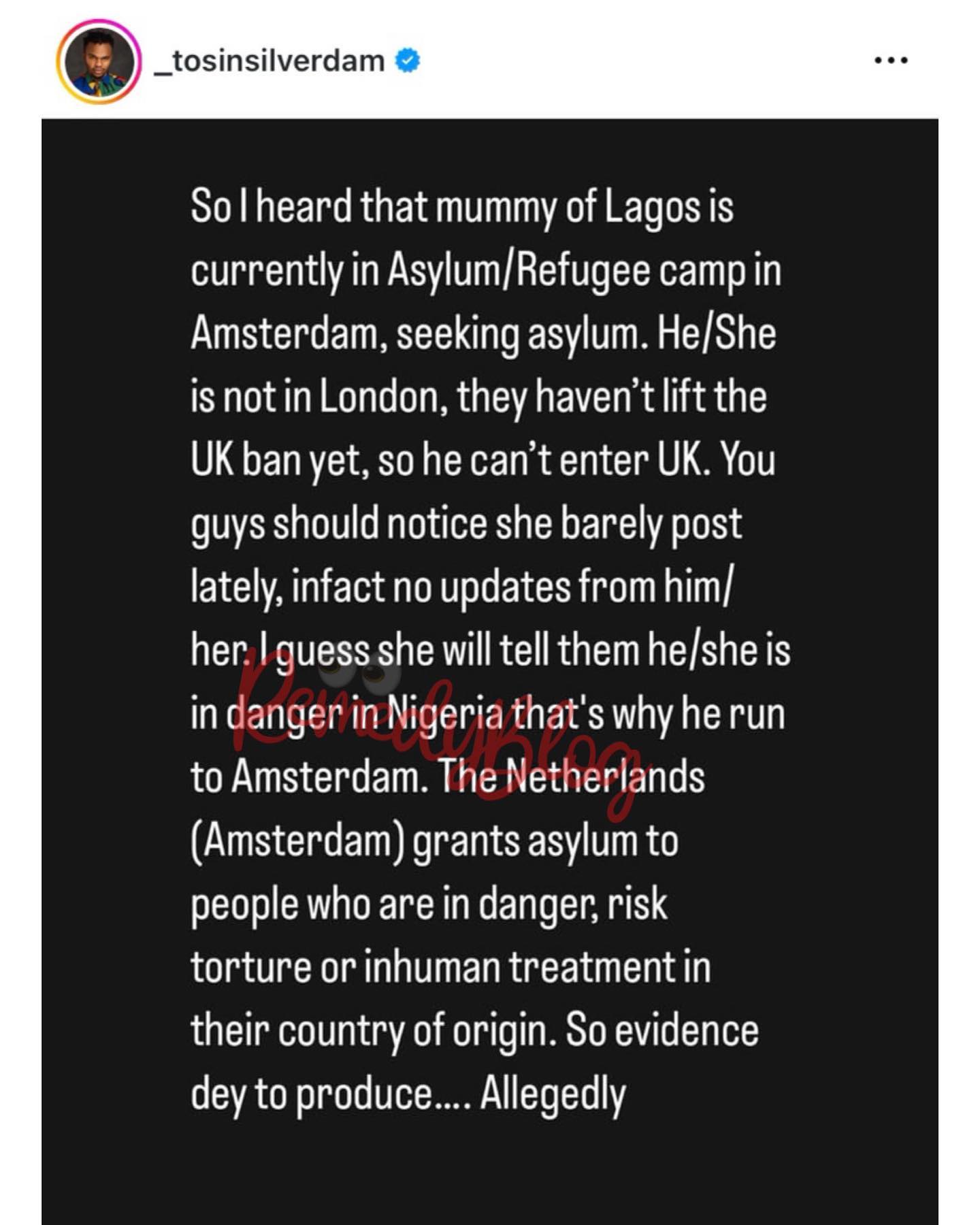Social media landscape, controversial crossdresser Bobrisky, famously known as “Mummy of Lagos,” is reportedly seeking asylum in Amsterdam, contradicting previous claims of living a luxurious life in the United Kingdom. This revelation has sparked intense discussion about the apparent disconnect between the social media star’s carefully curated online persona and alleged current circumstances.
The surprising news came to light through popular social media blogger Tosin Silverdam, who revealed that the Nigerian celebrity is currently residing in a refugee camp in Amsterdam. This development presents a stark contrast to Bobrisky’s well-documented social media presence, which has consistently portrayed a life of opulence and extravagance.
According to Silverdam’s detailed report, several factors point to the validity of these claims. Most notably, Bobrisky’s recent social media activity has shown a marked decrease, with the usually prolific poster maintaining an uncharacteristically low profile. This sudden change in online behavior has raised eyebrows among followers who have grown accustomed to regular updates about the star’s supposedly lavish lifestyle.
The situation becomes more intriguing when considering the existing UK travel ban against Bobrisky, which effectively prevents entry into Britain. This restriction has apparently led to the choice of Amsterdam as an alternative destination, where the Netherlands’ humanitarian asylum policies offer protection to individuals facing persecution or inhuman treatment in their home countries.
The timing of this revelation is particularly significant as it follows closely on the heels of a recent controversy involving Bobrisky and allegations of a ₦4 million debt. This sequence of events has led many observers to question whether there might be more to the social media star’s current situation than previously known, suggesting possible underlying challenges that contrast sharply with the glamorous image typically presented to the public.
Silverdam’s report suggests that Bobrisky’s asylum application might be based on claims of facing danger in Nigeria, though the specific nature of these alleged threats remains unclear. The Netherlands, known for its progressive policies regarding asylum seekers, typically requires substantial evidence to support such claims, with applicants needing to demonstrate genuine risk or persecution in their country of origin.
This development has sparked a broader conversation about the reality behind social media personas, particularly in Nigeria’s entertainment sphere. The disparity between Bobrisky’s previous posts showcasing a life of luxury and the current allegations of seeking refugee status has led to intense speculation about the authenticity of online celebrity lifestyles in general.
The situation has also highlighted the complex nature of asylum seeking in European countries, where individuals must navigate strict immigration policies while demonstrating legitimate needs for protection. The Netherlands’ asylum system, while generous to those in genuine need, maintains rigid verification processes to ensure the validity of claims made by applicants.
For Bobrisky’s followers, this news represents a significant shift in narrative. The social media star’s previous posts had created an image of unfettered success and financial abundance, making the current reports of asylum-seeking particularly jarring. This contrast has led to widespread discussion about the often-blurry line between reality and carefully constructed social media presentations.
The relative silence from Bobrisky regarding these claims has only served to fuel further speculation. The decrease in social media activity, noted by many followers, stands in sharp contrast to the celebrity’s usually active online presence, lending additional weight to the refugee camp allegations.
As this story continues to develop, it raises important questions about the pressure faced by social media influencers to maintain certain images, even when their real circumstances might be drastically different. The situation also highlights the potential consequences of cultivating an online persona that may become increasingly difficult to maintain in the face of real-world challenges.
Whether these claims about Bobrisky’s current situation prove accurate remains to be seen, but the discussion they have sparked about authenticity in social media, the realities of seeking asylum, and the pressures of maintaining a public image continues to generate significant interest across Nigerian social media platforms. As more details potentially emerge, this story serves as a reminder of the often-complex realities that lie behind carefully curated social media facades.



